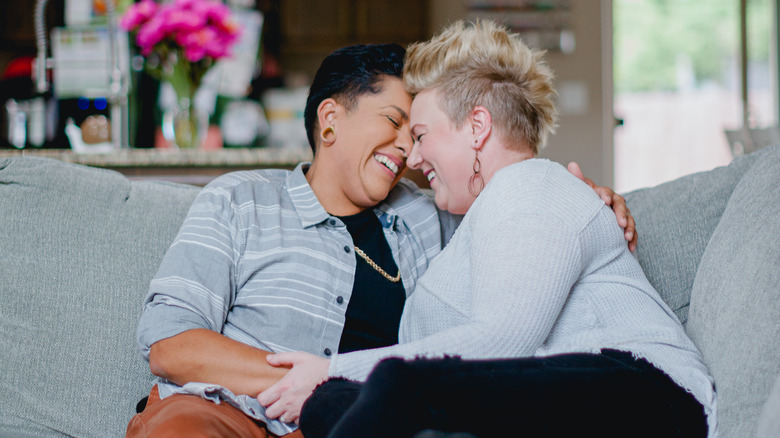Tread Carefully When Commenting On Your Partner's Appearance
When you're with the love of your life, it can feel like you are one and the same. You click on so many levels, agree on all the most important topics, and actually begin to finish each other's sentences. But it's important to remember that your sweetheart is still their own person, and may choose to express themselves in ways you would not have chosen for yourself. They may experiment with a new style trend that you aren't a fan of or try to grow out their hair longer than they ever have before. Their changing appearance may be a shock to you, but it's important to be careful what you say concerning their new look.
No one should base their self-expression or their self-image on how anyone else perceives them, including their significant other. While your input is usually welcomed and appreciated, it can also be very harmful if you give it incorrectly. There are some things about your partner's appearance that shouldn't be discussed unless they bring it up – and even then, it's best to tread lightly into sensitive conversations. While you can definitely let them know that blue is your favorite color on them or you love the way their new updo shows off their shoulders, commenting on things like hair loss or new breakouts can come off as mean-spirited. And when it comes to the size and shape of their body, it's best to keep comments to yourself — unless you are singing their praises, of course.
The size of their body is none of your business
Let's get this out of the way: Your partner's body is going to change. The longer you stay with the same person, the more you will experience different versions of them as they grow and evolve. When you sign up to be in a relationship with someone, you aren't just making a commitment to the person they are at the time you start dating. For most long-term monogamous couples, being in a relationship means continuing to love your partner through all the different seasons of their life; everything from the various hairstyles they try to their changing number on the scale.
One of the most common issues that couples tend to have over a partner's appearance is significant changes to their weight — and that isn't always a bad thing. A study in Obesity: A Research Journal found "women who transitioned from single/dating to married were more likely to become obese than individuals who transitioned from single/dating to dating." The weight gain is commonly attributed to a rising level of comfort and happiness with their new spouse. One of the things that will burst that bubble of happiness and trust real fast is a comment about their growing belly. Bringing up your partner's weight gain, even in an attempt to be funny or to have a "conversation about health," can be extremely hurtful and kickstart serious insecurities in your relationship. If you notice that your partner has gained a little weight, merely take it as a compliment that they feel comfortable around you, and leave it at that.
Your word choice is extremely important
We are all familiar with the stereotypical relationship question, "Does this outfit make me look fat?" While it might be easiest to simply say "no" and brush past the question, some people may have a harder time answering honestly if their partner's body has, in fact, changed. Similar questions can arise where your partner asks if they look good, noting their body's changes. You may think that this is your "in" to make a comment about how you are not a fan of their change in appearance, however, be extra careful with your reply. Most of the time that your partner asks these types of questions, it is because they themselves are feeling insecure and are looking for reassurance that they are still attractive to you. If you respond to their bid for connection with a criticism, this will only deepen their insecurity.
Loaded questions like this can be difficult to answer honestly. Sex therapist Vanessa Marin told Bustle that you do not have to answer directly if you think it will cause further harm to lie. She suggested saying something that will ease your partner's mind and allow them to feel confident in your love no matter how their appearance changes. You then, however, do have to follow through and actively accept their changing appearance.
Some discussions of appearance are simply off limits
Once you've found "the one," you hope that your relationship can last a lifetime. But over the span of your lengthy relationship, you will learn things about your partner that may not appear extremely attractive at first. Maybe they have aggressively thick body hair that they struggle to remove each day, or they have fought a lifelong battle with body acne. Many people's external insecurities derive from genetics, and cannot be altered without serious time, money, and in some cases, surgery. If your partner is experiencing changes that don't have easy fixes, it might be best to rethink your comments.
Rest assured that your partner most likely is aware of any changes. As sex therapist Vanessa Marin advised in Bustle, put yourself in your loved one's shoes. Would you be comfortable hearing comments or criticism about your body that you are still coming to terms with? Most likely, the answer is no. While changes to your loved one's appearance can be a slight adjustment at first, it does not pale in comparison to how your partner may feel when navigating changes to their own body. Bodies widely fluctuate over time, and experiences such as trauma, mental health struggles, childbirth, illness, or injury can all cause significant weight loss or gain. These are the moments when your partner needs your unwavering support the most, not your criticism.
When it comes to healthy habits, you can give positive encouragement
There are cases where your partner may be headed towards some dangerous habits that you want to discourage. If they fall into a depressive state and stop performing basic hygiene maintenance like showering, brushing their teeth, or fueling their bodies, it is definitely safe to sit them down and have a talk. Keep in mind that they are most likely in a sensitive space, and begin your discussion with loving remarks. Remind your partner that you care for them and that you have noticed they are having a hard time. Try setting goals together and ask what you can do to make it easier for them while they navigate through this tough time.
If you are worried your partner is becoming increasingly unhealthy, consider working towards body neutrality to encourage a healthy self-image. People who have developed a poor relationship with food or exercise may find it triggering to discuss lifestyle changes. Continually remind your partner that you are in a safe, judgment-free space. You can also set a positive example by achieving your own exercise and health goals, and encourage them to join you when they feel ready. Don't wait for your partner to make your own healthy choices; be the encouraging influence that they need to join you on your health journey.
What to do if you are no longer feeling attracted to your partner
The standards of beauty and the "perfect body type" are always changing, especially in the new age of technology. From all the filters meant to enhance your features to the growing worries about being "catfished," people are placing more importance than ever on their potential partner's appearance. But in reality, there are so many more important things to look for in a partner, especially because their looks will inevitably change over time.
If your partner's appearance has changed significantly over the course of your relationship, you may worry about feeling less attracted to them. Maybe they gained a significant amount of weight after bearing a child, or they have chosen to rock the bald look after beginning to lose their hair. While you may still love who they are, they no longer look the way they did when you first met, and you can't seem to get over their changing appearance. In this case, we do encourage you to rethink your values when in a relationship. One study in the Personal Relationships journal found that people who highly prioritized looks in their partners had a history of shorter, less happy relationships. Ultimately, if you cannot accept the changes to someone's appearance, it is not fair to stay in a relationship with them. Everyone deserves to be loved by someone as they are now without the expectation to stay the same weight or maintain the same hair color from years ago.





